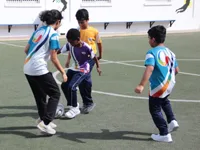Rising education costs make it difficult for a lot of families to keep up. If you want to make sure your child gets access to the best resources, though, being awarded a scholarship is one way to make that happen. Encourage your child to apply for educational grants. That way, your child can pick any course, meet a network of equally talented peers, and receive the training and education that will help set your little one for the future s/he wants. Here’s how to motivate your child to get started.
Also Read: Motivate Students to Apply for Scholarship
1. Start Early
It’s always smart to start preparing as soon as possible. When you encourage your child to apply for scholarships, though, try to touch on the idea while your child is still young. Don’t spring up that idea when your teenager is about to start third or fourth year in high school. If your child is in primary school, start talking about that idea at an early age. That way, you can take steps to prepare your child much sooner.
2. Talk About Extracurriculars
Are there any extracurricular activities that your child enjoys? Does your child have an exceptional skill in any sports? What about the arts or writing? There are scholarships that cater to interests and skills in these fields. If your child develops a talent for any of them, and that talent turns out to be exceptional, your little one could be eligible for an educational programme.
3. Do Your Homework
Find out what the available scholarships are. It wouldn’t hurt to start checking them out while your child is still young. Look over the submission requirements and eligibility guidelines. What will ensure that your kid is qualified when the time comes? Doing this will give you a good idea about what educational grants look for in terms of academic and extracurricular experience. You could start training your child at such a young age by encouraging extracurriculars. That’s one way to help strengthen your child’s application portfolio.
4. Discuss Costs and Finances
Your child should learn about money early on. Explain costs and finances so your child understands that education costs a lot of money. You can touch on college loans, how important it is for you as a parent to establish a college budget, and how much of a difference a scholarship could make in your lives. Talk about it in a way that doesn’t pressure your child, though, to apply for a scholarship. Going in too strong right from the start could backfire and lead your child to withdraw from the challenge, thinking there’s absolutely no way s/he would ever qualify.
5. Praise Every Effort
We’ve all heard about kids growing up entitled and feeling like the world owes them for putting in the smallest measure of effort into anything. That’s not the kind of child you want to raise. With that in mind, though, praising every effort is good so long as your little one understands how the world works: that it doesn’t owe them anything for the effort they put into anything. The sooner they understand that, the sooner they’ll appreciate praise. Because they know it’s not a fair world out there, that things can and will go wrong, that they—or even you—won’t always be in control of what’s going to happen; so that when something does go right, when they receive praise, they know how precious that is against everything in the world and they will love that kindness all the more. When you praise their efforts to try for a scholarship, the positive feelings that surround that will motivate them to try their best.
6. Proofread the Essay
Application kits contain a section for the student’s personal statement essay. No, don’t do it yourself. No matter how much you want to help your child, writing the essay for your little one isn’t going to help. What will help, though, is for you to go over what your child has written and offer constructive feedback and advice.
How will your child improve this section? What idea does s/he want to explore in this paragraph? Does the essay read like it’s nothing more than a collection of facts and figures? If that’s the case, you’ll want to encourage your child to make that piece personal. It can touch on how unique and how uniquely suited your child is for the programme.
7. Try Out for Many
When your kid starts applying for scholarships, make sure you emphasize the importance of trying out for more than one. Sure, your child will start with one. But that first attempt isn’t often successful. This is usually when parents and kids make a lot of mistakes, which makes the next attempts much better and successful. That’s also why it’s good to apply for many scholarships. As long as your child can handle all the extra tasks and responsibilities, applying for many scholarships increases the chances of getting chosen for a grant.
8. Help with an Organization Plan
Organization is key in applying for scholarships. If your child is disorganized, that will make it much harder to keep track of deadlines and requirements. You could help your child come up with a timeline. Show your little one how to create a calendar or timeline that contains all the important deadlines. Once those are in place, your kid will then need to work out a schedule for getting the tasks or requirements in the application done. When should s/he finish with the essay, for instance? Since the essay might need a lot of work, budgeting a ton of time for that is a good idea. There should be time to proofread and revise the piece and then have it proofread again.
9. Offer Incentives
A few incentives can also boost your child’s motivation levels. For instance, you can make a deal with your child about increasing screen privileges or negotiate for additional allowance. If you see how hard your child works on applying for the scholarships, getting a few gifts wouldn’t hurt as well. Just make sure your kid doesn’t get the idea that doing something must always merit gifts. The scholarship is for them, too. If you can’t handle the costs of their education, your child will need to work to help make ends meet. By suggesting scholarships, you make it possible for your little one to work towards a goal, one that will make his/her education goals come true.
10. Give a Free Pass
It takes time to research about scholarships and apply. If you know your child is working hard to study for those applications and exams, give your little one a free pass on the chores. Let your child focus on the application process. With more time spent on studying and applying for scholarships, you help your child get that much closer to getting a grant. That’s you showing your support and it’s almost the same as you telling your little one that you believe in them, that you know they can do it, and that they should keep trying even when they fail the first or second time. If they want to keep trying, support them.
Going for an educational grant isn’t easy. But having supportive parents can make a world of difference. Follow these suggestions if you want to make that happen for your child.

























